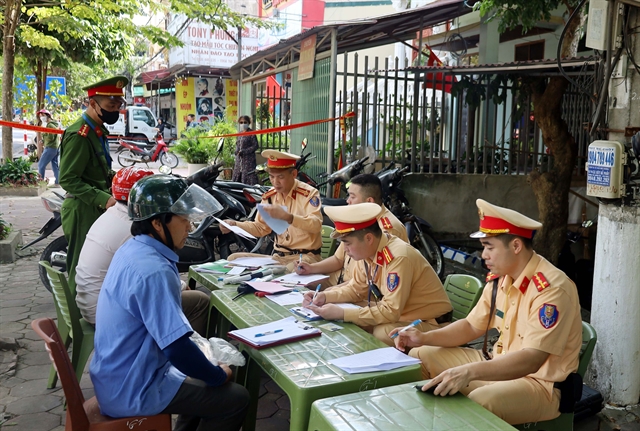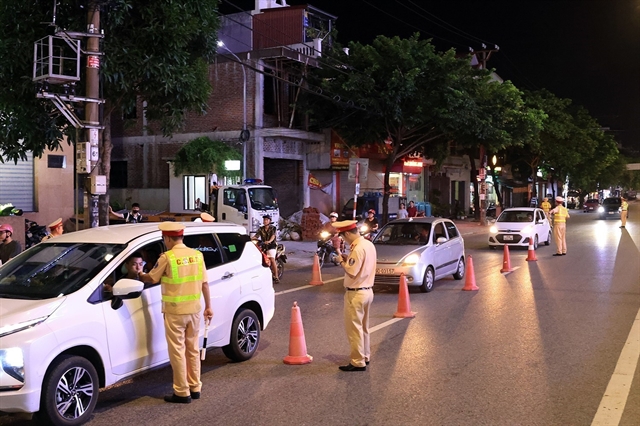 Society
Society

 |
| Traffic police check alcohol concentration in drivers' breath in the northern province of Ninh Bình.—VNA/VNS Photo Tuấn Anh |
HÀ NỘI — Prime Minister Phạm Minh Chính has ordered the enforcement of strict penalties against officials, civil servants and military personnel who violate regulations on operating vehicles under the influence of alcohol and those who fail to cooperate with authorities in addressing such violations.
The order is outlined in Circular No. 35/CT-TTg, which was recently signed by Chính.
According to the directive, under the firm guidance of the Politburo, Government and Prime Minister, there has been a positive shift in awareness of and adherence to traffic laws among a significant portion of officials, Party members and the public, contributing to a safer traffic environment.
However, there remains a segment of officials, civil servants and military personnel who still violate traffic laws.
Instances of non-compliance with checks and enforcement actions, particularly regarding alcohol violations, have been reported.
Notably, some cases involve individuals operating vehicles under the influence, resulting in fatal accidents and subsequent attempts to flee the scene or resist law enforcement, leading to public outrage.
Data shows that over the past year and the first quarter of this year, more than 7,600 officials, civil servants and military personnel were subjected to administrative penalties and notifications sent to their respective managing bodies for alcohol-related violations.
The cause of the violations was primarily attributed to a lack of self-discipline and insufficient recognition of the responsibilities involved in maintaining order and safety among some officials, civil servants and military personnel.
Heads of administrative agencies and public service units have not prioritised the Party and Government's directives concerning traffic safety, resulting in lax discipline and accountability.
Inadequate management and failure to impose appropriate disciplinary measures against violators have exacerbated the situation.
Accidents caused by officials and civil servants not only affect the reputation of the individuals, but also breeds dissatisfaction among the public.
The situation necessitates a more robust approach to enforcing compliance with traffic laws among officials, civil servants and military personnel, thereby fostering ethical standards and a culture of proper conduct within these groups, the directive notes.
Chính mandated that Ministers, heads of ministerial-level agencies, heads of governmental bodies and chairpersons of municipal and provincial People's Committees must acknowledge the critical importance of leading by example in adhering to traffic laws.
“This is essential for reshaping societal habits regarding legal compliance, especially concerning traffic regulations,” the directive states.
Upon receiving notifications from relevant authorities regarding traffic violations by officials, civil servants or military personnel involving alcohol, the respective management bodies must follow strict procedures for disciplinary action in accordance with regulations.
Such actions must be fair, transparent, strict, accurate, timely and within the correct jurisdiction and procedures.
“Any attempts to conceal or overlook infractions will not be tolerated,” the directive notes.
Annual reports on disciplinary outcomes must be submitted to the Prime Minister before 15 October.
Responsibility must also be reviewed for leaders of agencies or units where multiple individuals violated alcohol regulations.
The Minister of Public Security was told to supervise law enforcement agencies' adherence to the laws during patrols and checks, ensuring that no exceptions or interventions allow for violations to be overlooked.
Disciplinary actions must be taken against any officials who fail to enforce the law rigorously.
The Minister of Defence must ensure that military personnel strictly comply with traffic laws, particularly regarding the prohibition of operating vehicles after consuming alcohol, and cooperate with law enforcement in investigating alcohol-related traffic incidents involving military assets.
Furthermore, any violations of alcohol regulations by military personnel must be met with rigorous scrutiny and disciplinary action.
The Minister of Home Affairs is tasked with raising awareness, disseminating information and monitoring compliance among officials and civil servants regarding alcohol violations.
Chairpersons of municipal and provincial People's Committees are required to develop specific action plans that align with the directive, tailored to local conditions and requirements.
In a related move, the People's Committee of Hà Nội also directed relevant bodies to strictly handle officials, civil servants and military personnel found violating traffic regulations related to alcohol consumption and those failing to cooperate with enforcement agencies.
Deputy Chairman of the committee Dương Đức Tuấn urged directors and heads of departments to ensure officials comply with traffic safety regulations and impose strict penalties on those violating alcohol regulations.
The committee emphasised the importance of officials exemplifying a pioneering spirit in adhering to traffic laws, which is crucial for reshaping habits of compliance with laws across society. — VNS




